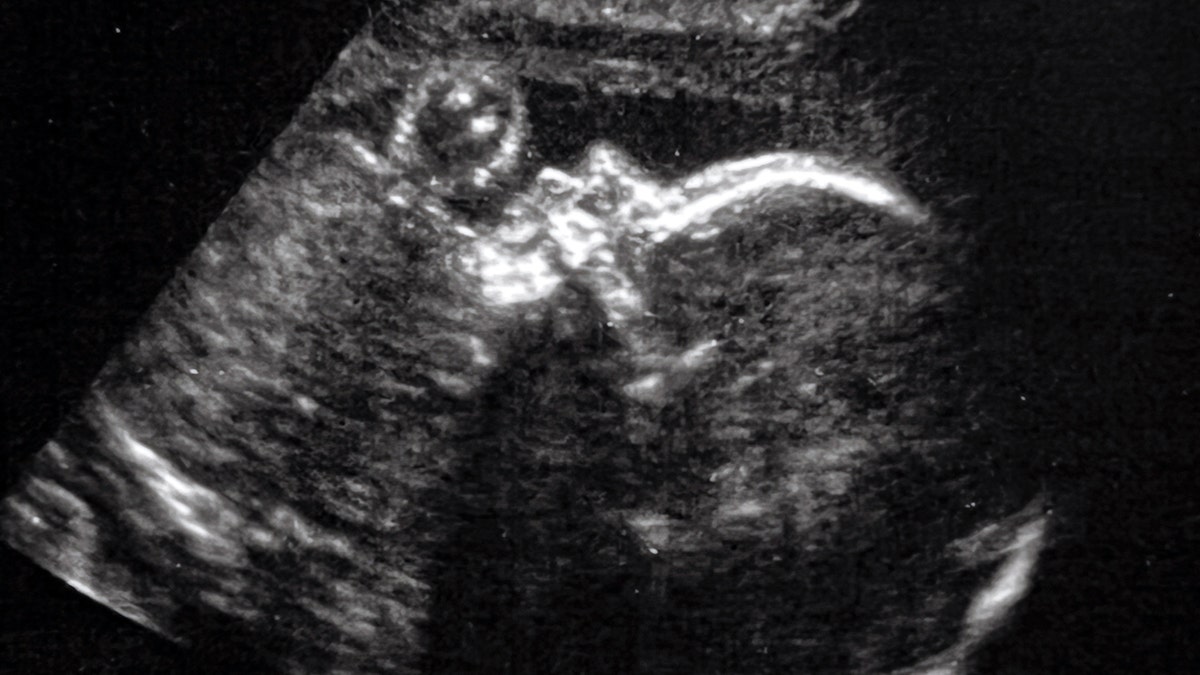Fox News Flash top headlines for May 4
Fox News Flash top headlines are here. Check out what's clicking on Foxnews.com.
In a first of its kind, doctors have performed brain surgery on a baby inside the womb in a Boston hospital.
The surgery was performed to fix potentially deadly damage to blood vessels — and it saved the infant from suffering both heart failure and a stroke after birth, news agency SWNS reported.
The rare pre-natal condition is known as Vein of Galen malformation (VOGM).
NEVADA CHILDREN HAVE EXPERIENCED RARE BRAIN INFECTIONS AND ABCESSES AS CDC INVESTIGATES
In VOGM, arteries carrying "high pressure" blood connect to one of the main veins deep at the base of the brain, said SWNS.
Normally, as a fetus develops, "these arteries should link to smaller capillaries — slowing blood flow and delivering oxygen to surrounding tissue," that agency noted.
VOGM is most often first seen on a pre-natal ultrasound scan, then diagnosed by MRI (magnetic resonance imaging) during the late second or third trimester of pregnancy.

The groundbreaking surgery was performed to fix potentially deadly damage to blood vessels. It saved the infant from suffering heart failure and a stroke after birth, according to reports. (SWNS)
It is estimated that VOGM, the most common congenital vascular brain malformation, occurs in as many as one in every 60,000 births, SWNS reported.
The U.S. team reportedly used ultrasound to carry out the successful procedure at 34 weeks and two days gestational age.
Due to the rupture of membranes, the baby, who is unnamed, was delivered by the induction of vaginal birth two days later and is now home, SWNS said.
"In our ongoing clinical trial, we are using ultrasound-guided trans-uterine embolization to address the Vein of Galen malformation before birth," said Professor Darren Orbach, M.D., PhD, of Boston Children's Hospital, according to SWNS.
"We are pleased to report that at six weeks, the infant is progressing remarkably well."
"In our first treated case, we were thrilled to see that the aggressive decline usually seen after birth simply did not appear," he also said.
Repeated echocardiograms post-birth displayed "marked" improvement in cardiac output in the infant, said SWNS — while scans showed "normal heart and brain function."
FLORIDA TODDLER ZIPS AROUND LIFE IN HIS TINY WHEELCHAIR: ‘HE’S GROWN SUCH A FOLLOWING'
The baby remained in the neonatal intensive care unit for several weeks, and during that time, had a "normal neurological exam" and showed "no strokes, fluid buildup or hemorrhage on a brain MRI."

The infant (not pictured) reportedly suffered from a rare prenatal condition known as Vein of Galen malformation (VOGM). (iStock)
Dr. Orbach also said, "We are pleased to report that at six weeks, the infant is progressing remarkably well, on no medications, eating normally, gaining weight and is back home."
He also noted, "There are no signs of any negative effects on the brain."
In the medical journal Stroke, experts described the study as "pioneering."
UK TODDLER EATS ALMOST ANYTHING: VIDEO SHOWS HER DOWNING MUSSELS AT JUST 2 YEARS OLD
The premature newborn did not require any cardiovascular support or surgery following the treatment.
"This is only our first treated patient," said Dr. Orbach, calling it "vital" that the trial continue, in order to "assess the safety and efficacy in other patients."
"The key advance here is to intervene before the physiologic events of birth can cause life-threatening heart failure."
He added, "This approach has the potential to mark a paradigm shift in managing Vein of Galen malformation, where we repair the malformation prior to birth and head off the heart failure before it occurs, rather than trying to reverse it after birth."
He also noted, "This may markedly reduce the risk of long-term brain damage, disability or death among these infants."
The current standard of care for VOGM is treatment after birth with embolization — a catheter-based procedure to close off the direct artery-to-vein connections and block excess blood flow to the brain and heart, said SWNS.
PREDICTED TOP 10 BABY NAMES OF 2023 REVEALED, FROM LIAM TO OLIVIA: REPORT
Embolization itself is high risk, however, and not always successful at reversing heart failure, it also said.
Additionally, severe brain damage may have already occurred, which may lead to lifelong cognitive disabilities and life-threatening conditions for the infant, or even death, SWNS also noted.

Dr. Darren Orbach of Boston Children’s Hospital and Harvard Medical School is shown. "This is only our first treated patient," he said, calling it "vital" that the trial continue to "assess the safety and efficacy in other patients." (SWNS)
Professor Gary Satou, a fetal cardiologist at the University of California, Los Angeles, said the intervention may be "very impactful" in a specific group of patients.
"As always, a number of these fetal cases will need to be performed and followed in order to establish a clear pattern of improvement in both neurologic and cardiovascular outcomes," said Satou, as SWNS reported.
"This is pioneering work being done in a very careful and responsible way."
"Thus, the national clinical trial will be crucial in order to achieve adequate data and, hopefully, successful outcomes," he added.
Professor Colin Derdeyn, a neuro-interventional radiologist at the University of Iowa who performs VOGM embolizations on neonates, also "cautiously welcomed" the breakthrough.
FOUR SISTERS ARE PREGNANT AT THE SAME TIME, DUE WITHIN SIX MONTHS OF EACH OTHER
"The key advance here is to intervene before the physiologic events of birth can cause life-threatening heart failure," Derdeyn said, according to SWNS.
"There are caveats," he continued. "One successful case is not enough experience for us to conclude that the risks of this procedure are worth the benefits."

The unnamed infant is reportedly home from the hospital after in utero brain surgery. (iStock)
He added, "Safety issues may crop up in future procedures, and this approach through the veins may not be consistently successful in preventing heart failure."
He also said, "The procedure described here is designed to reduce the flow through the malformation and not to cure it."
CLICK HERE TO GET THE FOX NEWS APP
He continued, "However, the positive hemodynamic changes that they observed in utero and after birth — reduction in flow, reduction in size of the draining vein, reversal of the abnormal reversed flow in the aorta — are really encouraging."
CLICK HERE TO SIGN UP FOR OUR LIFESTYLE NEWSLETTER
He added, "These are some of the most exciting and surprising aspects of this case report. This is pioneering work being done in a very careful and responsible way."










































